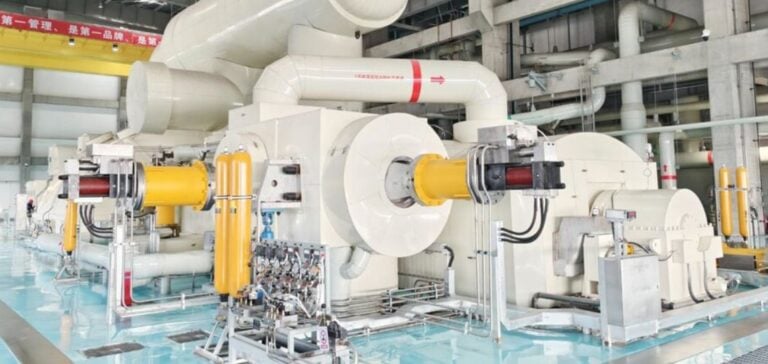The Binchang project, developed by Harbin Electric Corporation, marks a major milestone in the evolution of coal-based technologies. Located in Shaanxi Province, China, the project features the world’s largest 660 MW ultra-supercritical circulating fluidized bed (CFB) boiler. Yet, as global energy transition efforts accelerate, such installations spark crucial debates about the future of coal.
A technological breakthrough for energy efficiency
With a steam pressure of 29.3 MPa and operating temperatures exceeding 600 °C, this boiler sets new benchmarks. It enables the efficient conversion of unconventional fuels, such as low-calorific-value coal and mining residues (slime and gangue), while minimizing emissions with a 95% desulfurization rate.
This ultra-supercritical model, entirely designed and manufactured in China by Harbin Boiler Company, Harbin Turbine Company, and Harbin Electric Machinery Company, showcases the expertise of these entities. It represents a significant advancement in low-cost energy production, tailored to growing industrial and residential needs.
A project at the crossroads of environmental challenges
The project goes beyond electricity production. It incorporates crucial ecological initiatives:
– The recovery of solid waste and mine water for energy production.
– Land restoration in the Yellow River basin, aligning with environmental rehabilitation goals.
However, these efforts are tempered by the nature of the fuel used: coal. Despite technologies to reduce emissions, this installation will still emit a significant amount of carbon dioxide (CO₂), contributing to global warming.
The paradoxes of investing in coal
This project aligns with a national energy strategy. While China invests heavily in renewable energy, it continues to develop advanced coal technologies to ensure the stability of its power grid. The dual objective is to:
1. Secure a reliable energy supply for industrial and residential areas.
2. Maximize local low-quality resources that often go unused.
Still, this investment raises questions. International climate commitments advocate for a gradual coal phase-out. In this context, China risks misalignment with global market demands and emission reduction goals.
An exportable technology or a strictly national model?
The ultra-supercritical CFB technology developed for the Binchang project shows export potential. With its enhanced energy efficiency and reduced local emissions, it could meet the needs of countries still reliant on coal.
However, growing international pressure to abandon fossil fuels limits the attractiveness of such installations. Nations undergoing energy transition now favor renewable solutions, which are more competitive in the long term. As such, this innovation might remain confined to domestic markets, where coal retains a strategic role.






















